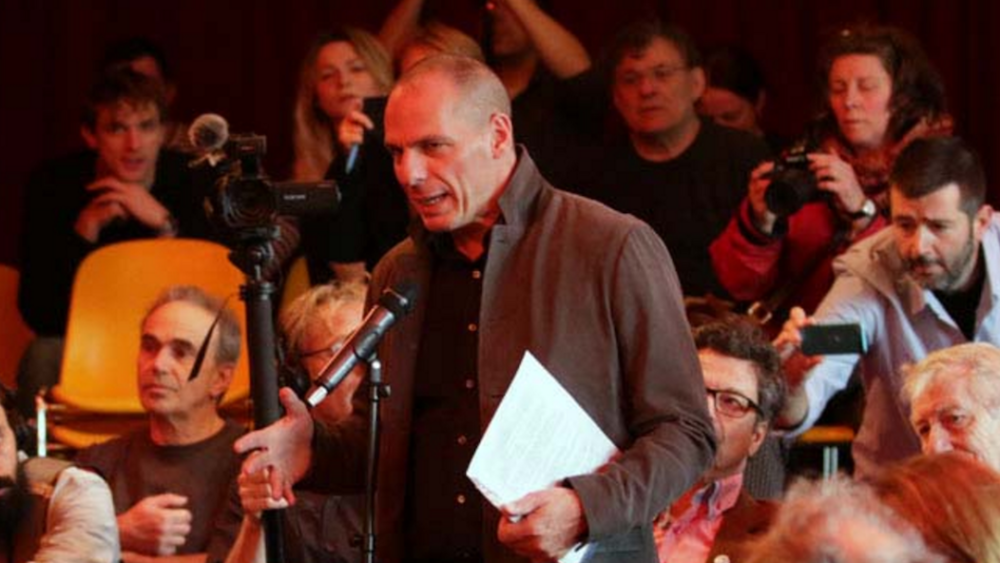Originally published in Newsweek on May 2nd, 2016.
Much was made recently of the U.K.opposition leader Jeremy Corbyn’s statement that I was helping his team “in some capacity.” George Osborne, for one, jumped at the opportunity to take a shot at Labour by mocking me, luxuriating visibly in my defeat in the hands of a despotic EU. Even David Cameron, not to be left out, added his own little quip.
One senses that our economies are faltering and our governments are clueless when zero interest rates produce lower investment and leading politicians resort to personal insults in response to legitimate questions about their Treasury’s falling tax take or the unaffordability of housing.
Before delving into what truly matters here, a correction is in order: I was never asked (nor would have I accepted if asked) to be an advisor to Jeremy Corbyn or his team. As a full time politician, and initiator of DiEM25 ( Democracy In Europe Movement) it is not my job to advise other politicians. Engaging with parties and organisations across Europe is another matter. It is in this “capacity” that I am involved in Britain with Jeremy Corbyn, his Shadow Chancellor John McDonnell, and also politicians from other political parties, including Caroline Lucas (Greens) and my good friend Norman Lamont (Conservative).
But enough on trivial details. What truly matters today is that our economics and our politics are in disarray. Throughout Europe.
Markets perform their function when they synthesize dispersed information, that no one agent possesses, into signals that help coordinate our productive efforts. Similarly, democratic politics works well when it brings together people who individually do not have the answers but who can, collectively, generate decent policies.
The trouble is that in Europe we are failing on both counts. We are generating the lowest level of investment relative to savings (despite record-low interest rates) and the worst record of political coordination in the history of the European Union. Both on the continent and in Britain, these two spectacular failures lead to spasmodic reactions, dead-end policies and generalized pessimism that reinforce the economic malaise.
In the economic realm, self-defeating austerity is the symptom of a vicious cycle. Low investment begets low economic activity which depresses the government’s tax take, reinforcing the kneejerk tendency to bring in new cutbacks in a budget made unsustainable not by the size of public expenditure but by low, and diminishing, investment. Austerity, in this reading, is a symptom of low investment which can never be cured either by austerity or by negative interest rates. This applies across Europe, in the Eurozone but also in Britain.
A similar doom loop poisons Europe’s politics: the economic malaise undermines our capacity to engage in a high quality debate on how best to address the systemic economic crisis. In the absence of such a debate, our peoples and politicians descend into a mire of petty squabbles, blame games, insults, nationalist crescendos and xenophobia that, in turn, solidify the dead-end policies responsible for the economic malaise.
Worse still, Europe’s two vicious cycles, economic and political, feed off each other, pushing the good ship Europe toward the eye of a perfect storm. It is time that politicians took a moment to reflect on how best to deal with the causes of our collective failure—not its symptoms.
The Labour Party has an instinctive urge to protect those left behind by the long years of uneven private-debt-fuelled growth and its austerian aftermath. This is good and proper. However, it would be a mistake to waste Labour’s energies on tirades against austerity. If I am right that austerity is a symptom of low investment (and of a government keen to push the inevitable burden on the weaker citizens), Labour should concentrate on policies that will shift idle savings into investment funding, engendering new technologies that produce green, sustainable development and high quality jobs.
Such an economic program will require the creation of a public investment bank that issues its own bonds (to be supported by a non-inflationary Bank of England quantitative easing strategy targeting these bonds), but also a new alliance with enlightened industrialists and parts of the City keen to profit from sustainable recovery. Labour, I believe, will only overcome its infighting, and the toxic media campaign against its leader, by escaping into a Green, investment-led British Renaissance.
The fact that this is also what the Eurozone needs offers Labour a golden opportunity to link its optimal referendum campaign with an appealing domestic economic agenda. Proposing an economic program that is relevant both in the UK and in the Eurozone would be a good start.
Having summed up my ‘advice’ to the Labour Party, I shall end with a message for the Chancellor (and his Prime Minister):
Dear George,
Michael Gove, Michael Howard and Boris Johnson are arguing, against you, for Brexit on solid intellectual grounds concerning the EU’s curtailment of your Parliament’s democratic sovereignty. Even though our democracy was indeed crushed last summer by the EU, I happen to disagree with them.
However, I am intrigued that you seem not to realize that by mocking me in that same Parliament you reinforced their already strong case for Brexit. My failure as finance minister was due to the ironclad determination of an authoritarian EU to continue with its failed Greek economic program. My ministry’s Policy Program for Greece, which Brussels pushed aside, I had put together with input from economic experts including Lord Lamont and [American economist] Jeff Sachs. I trust that, with hindsight, you would not have taken that cheap shot. It was one that the “Stay” campaign can ill afford.
Do you want to be informed of DiEM25's actions? Sign up here















